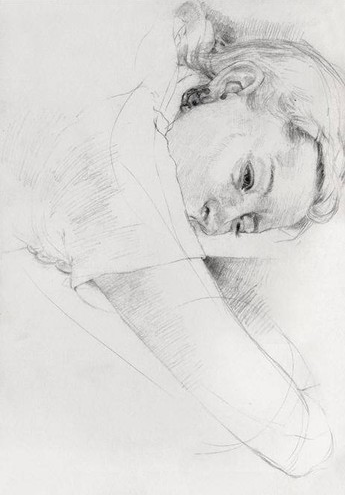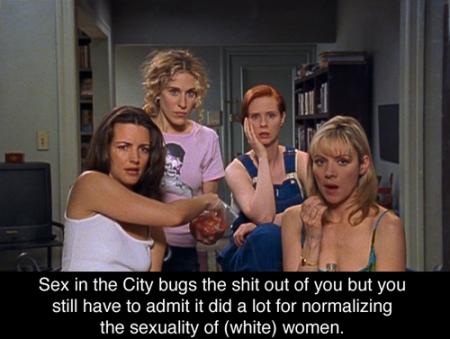Serendip is an independent site partnering with faculty at multiple colleges and universities around the world. Happy exploring!

Mom's feminism vs My Own :-)
Critical Feminist Studies has been one of the most valuable classes I have taken so far at Bryn Mawr. When I entered the classroom, I was a self-declared feminist. Having grown up with a mother and aunt who are both very pro-choice and empowering, I saw feminism as something rather basic – the act of fighting for the rights of women to be equal to those of men. However, I quickly learned that there are so many aspects of feminism that one has to learn about in order to be able to fight for each of those rights within the larger foundation of feminism. This really made my head ache once we started talking about all the various ways the direction of the class could grow. . . It was not at all as “basic” a viewpoint as I had thought. Everything my Mom had taught me had just been expanded to the utmost dimension. . .ahhh!
It's Real
I was a child racked with nightmares. I spent many nights whispering for my dad in the night, sweating and stricken to my bed, wondering why he couldn’t hear me. I would dart down the hall to his bed and shake him awake “Daddy! Daddy, can I sleep with you?” I would gladly crawl into his bed, cuddle with my stuffed animal, and fall peacefully asleep. When I began to grow too old to be sleeping in my dad’s bed any longer, we had to have a talk. “It’s not real,” he said. “It’s all in your head. Just tell yourself in your nightmare that it isn’t real and I promise you won’t be scared anymore.” So my nightmares came less frequently and less intensely. I befriended the witch that hexed me and the ugly creature that always chased me turned out to have a sweet spot.


Self Evaluation
As with all new classes, I came into this class somewhat terrified and overwhelmed and possibly hoping that it would provide me with a space in my schedule where I at least felt somewhat comfortable in the sense of already having an idea about what counts for feminism and what counts for feminist theory. I was also looking forward to learning much more about feminist topics and the ways in which they play out in the world at large. I feel like this class gave me all of those things, while also pushing me to be more self-aware and more adventurous/creative in my approach to acadedmic work, as well as inspiring me to action as opposed to only working with theory.
In thinking about the edges of my individual learning, I think this class highlighted three posible areas of needed growth for me. The first, and possibly most important to me, is that it continuosly challenged me to reconsider how I speak, what I speak to, and to whom I address my comments. It helped me to feel way more comfortable with being unsure and with being criticized, and it also helped me to think through how to have a productive conversation across various levels of understanding, which has led directly to my final project of attepting to institute a changing conversation about gender on our campus and in our community.
TV at the Feminst Table?
Over the past month or so I have been posting regularly about a new HBO program which provoked a lot of public attention, long before it even aired. I was interested in the show, and I was even more interested in what people in our course thought about it. But my “call to discourse” fell flat, so I have decided to take up the project myself. Now my primary interest in the show was not actually the topic, but the fact that the creator/director/writer was a female, liberal arts college graduate and only four years older than I am. Go Girls. I am not sure if it is widely understood how rare this is—look up any of your three favorite television programs, and chances are extremely high, regardless of the topic that the “creator/writer/director” of the pilot episode is male. And if you happen to watch a show conceived by a woman, chances are further likely that she has a male partner/co-creator. Shows about Girls, written by girls, created by girls, and directed by girls simply do not exist. The stories we watch and television every day are stories coming from a definitively male perspective. This is not meant as an inciting, insightful statement. It is nothing but and “is”.

Childbirth
When I began this project I decided I was going to write about the controversy over the cesarean rate in the United States. I have heard nurses and friends talk about the trend of rising rates in cesareans, and from the conversation I’ve realized it’s a very controversial topic. I am interested in women’s health, so I started asking my health care providers what they thought of the c-section rate in the U.S., and I started seeing a trend that people’s view on c-sections often has do with a more general outlook on obstetrics. Many of the people who I came across that didn’t approve in the increasing rate of c-sections had other complaints about how obstetric units are run. People who disproved of the c-section rate often felt that medicine practiced in hospitals is too ‘interventionalist’ and treats birth like there is going to be an abnormality, when in general births are normal. Of the people that told me they didn’t think there was something wrong with the c-section rate, they often had the outlook that giving birth outside of a hospital puts the mother and baby at unnecessary risk of being without a physician. After talking about birth and doing a bit of research I decided I wanted to not only do my paper on c-sections, but also on births in hospitals versus non-hospital births. I interviewed two ob/gyn’s and two certified midwives to try and get their opinions on the matter.





 Lorem ipsum dolor sit amet, consectetur adipiscing elit. Nulla nec mi at erat eleifend aliquet in in nisl. Aenean ultrices vulputate dui, venenatis egestas est venenatis pharetra. Donec vehicula fringilla sollicitudin. Duis in nunc at dolor interdum ullamcorper. Praesent auctor nisi vitae nisi pellentesque tincidunt. Duis convallis, ante sed tempor mattis, orci risus elementum tellus, vitae venenatis sapien lacus non magna. Etiam
Lorem ipsum dolor sit amet, consectetur adipiscing elit. Nulla nec mi at erat eleifend aliquet in in nisl. Aenean ultrices vulputate dui, venenatis egestas est venenatis pharetra. Donec vehicula fringilla sollicitudin. Duis in nunc at dolor interdum ullamcorper. Praesent auctor nisi vitae nisi pellentesque tincidunt. Duis convallis, ante sed tempor mattis, orci risus elementum tellus, vitae venenatis sapien lacus non magna. Etiam  cursus consectetur dui, at pellentesque nisl mattis ut. Morbi porta, mauris ut pretium fermentum, tortor nibh scelerisque ipsum, quis iaculis metus neque ut arcu. Pellentesque tincidunt turpis vitae felis sagittis posuere. Proin viverra vulputate faucibus. Ut egestas, lorem eu eleifend condimentum, nisi risus euismod sem, a tempus risus orci quis dui. Sed auctor, risus sit amet tincidunt fermentum, quam erat aliquet erat, nec scelerisque lectus eros non nulla. Etiam in ipsum sit amet ipsum viverra fringilla ac at nunc. Fusce mi tellus, pretium eget fermentum at, dapibus id tortor. Nunc eleifend posuere risus, sed dignissim turpis elementum vel. Etiam vel purus vel ante porta viverra.
cursus consectetur dui, at pellentesque nisl mattis ut. Morbi porta, mauris ut pretium fermentum, tortor nibh scelerisque ipsum, quis iaculis metus neque ut arcu. Pellentesque tincidunt turpis vitae felis sagittis posuere. Proin viverra vulputate faucibus. Ut egestas, lorem eu eleifend condimentum, nisi risus euismod sem, a tempus risus orci quis dui. Sed auctor, risus sit amet tincidunt fermentum, quam erat aliquet erat, nec scelerisque lectus eros non nulla. Etiam in ipsum sit amet ipsum viverra fringilla ac at nunc. Fusce mi tellus, pretium eget fermentum at, dapibus id tortor. Nunc eleifend posuere risus, sed dignissim turpis elementum vel. Etiam vel purus vel ante porta viverra.
